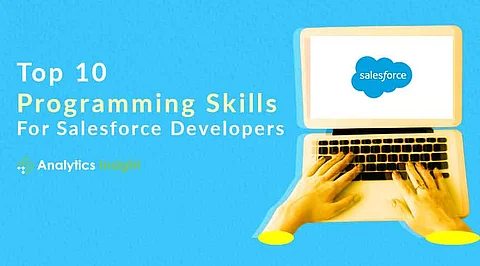

Salesforce, a leading cloud-based customer relationship management (CRM) platform, has transformed the way businesses engage with their customers. To harness the full potential of Salesforce and build robust applications, developers need a diverse set of programming skills. In this article, we'll explore the top 10 programming skills that are essential for Salesforce developers to excel in their roles.
At the core of Salesforce development is Apex, a powerful and proprietary programming language. Salesforce developers must be proficient in Apex to create custom business logic, triggers, controllers, and classes. Mastering Apex allows developers to tailor Salesforce applications to meet specific organizational needs.
Visualforce is a markup language that enables developers to create custom user interfaces within the Salesforce platform. It is essential for building dynamic and interactive pages, enhancing the overall user experience. Salesforce developers should be adept at using Visualforce to design and customize user interfaces seamlessly.
With the advent of Lightning Experience, Salesforce introduced the Lightning Components Framework for developing dynamic and responsive applications. Knowledge of this framework is crucial for developers to create reusable components, enabling the development of modern and user-friendly interfaces.
Salesforce developers often need to extend the functionality of their applications using client-side scripting. Proficiency in JavaScript is vital for implementing custom behavior in Lightning components, creating interactive pages, and integrating third-party libraries seamlessly.
Salesforce Object Query Language (SOQL) and Salesforce Object Search Language (SOSL) are query languages used to retrieve data from Salesforce databases. Developers need a deep understanding of these languages to perform efficient data queries and searches, ensuring optimal application performance.
Salesforce rarely operates in isolation. Developers must possess strong integration skills to connect Salesforce with external systems, APIs, and databases. Knowledge of integration tools like REST, SOAP, and middleware solutions is critical for building comprehensive and interconnected solutions.
As Salesforce continues to evolve, Lightning Web Components (LWC) have become the new standard for building components on the platform. Proficiency in LWC allows developers to create lightweight, modern, and efficient web components, contributing to a more agile development process.
Collaborative development is a hallmark of successful Salesforce projects. Salesforce developers should be well-versed in version control systems like Git to manage source code efficiently, track changes, and collaborate seamlessly with other team members.
Debugging is an integral part of the development process. Salesforce developers need to be adept at troubleshooting issues, identifying bugs, and optimizing code for performance. Proficiency in Salesforce debugging tools and techniques is crucial for maintaining application health.
The Salesforce ecosystem is dynamic, with regular updates, releases, and new features. Successful Salesforce developers embrace a mindset of continuous learning, staying updated with the latest advancements, attending Trailhead modules, and actively participating in the Salesforce developer community.
Salesforce developers play a pivotal role in shaping the success of organizations by leveraging the platform's capabilities to create tailored solutions. Mastering these top 10 programming skills empowers developers to build scalable, efficient, and innovative applications on the Salesforce platform, driving business growth and customer satisfaction.
Join our WhatsApp Channel to get the latest news, exclusives and videos on WhatsApp
_____________
Disclaimer: Analytics Insight does not provide financial advice or guidance. Also note that the cryptocurrencies mentioned/listed on the website could potentially be scams, i.e. designed to induce you to invest financial resources that may be lost forever and not be recoverable once investments are made. You are responsible for conducting your own research (DYOR) before making any investments. Read more here.
